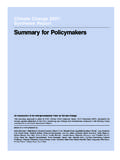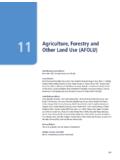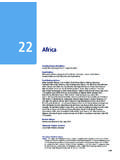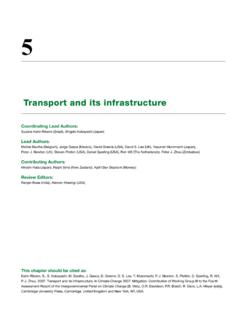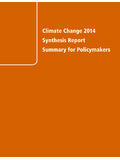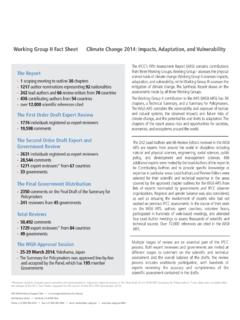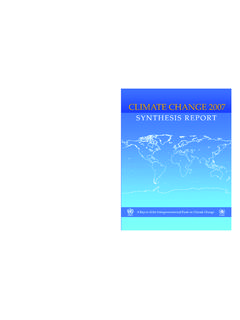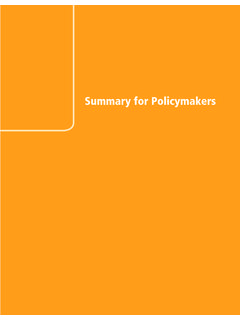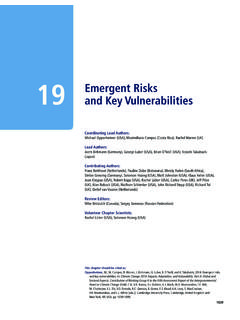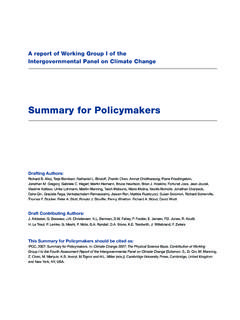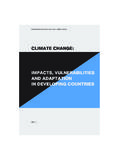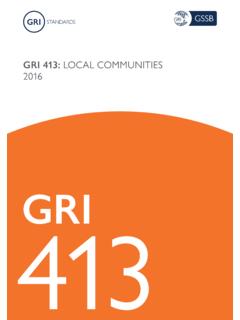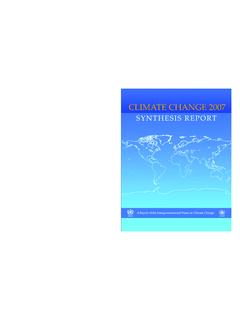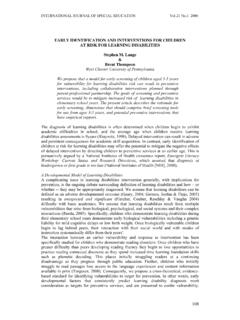Transcription of The IPCC and the Sixth Assessment cycle
1 The IPCC and the Sixth Assessment cycleThe Intergovernmental Panel on Climate Change (IPCC) is the UN body for assessing the science related to climate change. It was set up in 1988 by the World Meteorological Organization and United Nations Environment Programme to provide policymakers with regular assessments of the scientific basis of climate change, its impacts and future risks, and options for adaptation and mitigation. The IPCC does not conduct its own research. It identifies where there is agreement in the scientific community, where there are differences of opinion and where further research is needed.
2 It is a partnership between scientists and policymakers and it is this that makes its work a credible source of information for policymakers. IPCC assessments are produced according to procedures that ensure integrity, in line with the IPCC s overarching principles of objectivity, openness and transparency. IPCC reports are policy-relevant, but not 1988 the IPCC has produced five comprehensive Assessment Reports and several Special Reports on specific topics. IPCC has also produced Methodology Reports, which provide practical guidelines on the preparation of greenhouse gas inventories for the inventory reporting requirements of Parties to the United Nations Framework Convention on Climate Change (UNFCCC).
3 The Fifth Assessment Report (AR5) was finalized between 2013 and 2014. Its key findings are: Human influence on the climate system is clear The more we disrupt our climate, the more we risk severe, pervasive and irreversible impacts We have the means to limit climate change and build a more prosperous, sustainable futureLike other Assessment Reports, the Sixth Assessment Report (AR6) consists of three Working Group contributions and a Synthesis Report, which integrates the Working Group assessments and the Special Reports produced during the cycle .
4 At its 41st Session in Nairobi, Kenya, in February 2015, the Panel decided to continue to prepare Assessment Reports every 5-7 years and took a number of decisions regarding the preparation of the Sixth Assessment Report. At its 42nd Session in Dubrovnik, Croatia, in October 2015 the Panel elected a Bureau for the Sixth Assessment Report cycle . At its 43rd Session in Nairobi, Kenya, in April 2016, it decided the topics for Special Reports in the AR6 Assessment cycle , and considered modalities for addressing and enhancing the treatment of regional issues in the scoping of AR6.
5 Besides deciding to prepare AR6, at its 43rd Session the Panel accepted the invitation of the UNFCCC to produce a Special Report on the impacts of global warming of C. In addition, it decided to produce two other Special Reports, one on the oceans and cryosphere in a changing climate, and one on climate change and land. The Panel also decided to prepare a Methodology Report to refine the 2006 IPCC Guidelines for National Greenhouse Gas Inventories in order to update and provide a sound scientific basis for future international climate action especially under the Paris Agreement.
6 The three Special Reports and Methodology Report have already been produced. Special Report: Global Warming of C (SR15) Special Report: Climate Change and Land (SRCCL) Special Report: The Ocean and Cryosphere in a Changing Climate (SROCC) Methodology Report: 2019 Refinement to the 2006 IPCC Guidelines for National Greenhouse Gas InventoriesSpecialReportsOctober 2018 Global warming of CAn IPCC special report on the impacts of global warming of C above pre-industrial levels and related global green- house gas emission pathways, in the context of strengthening the global response to the threat of climate change, sustainable development.
7 And efforts to eradicate povertyThe Sixth Assessment cycle August 2019 Special Report on the Ocean and Cryosphere in a Changing ClimateSeptember 2019 Climate Change and Land:An IPCC special report on climate change, desertification, land degradation, sustainable land management, food security, and greenhouse gas fluxes in terrestrial ecosystemsMethodologyReportMay 20192019 Refinement to the 2006 IPCC Guidelines for National Greenhouse Gas InventoriesOthersCitiesA conference on cities and special attention to cities in the Sixth Assessment Report with the intention of a Special Report on climate change and cities in the Seventh Assessment CycleExpert MeetingsSeveral Expert Meetings and workshops are held to support the preparation of the Sixth Assessment Report.
8 Reports of these meetings are published as supporting materialsOutreachCommunication and outreach of the IPCC process and its findingsOutreachWorking Group I contributionThe physical science basisWorking Group III contributionMitigation of climate changeWorking Group II contributionImpacts, adaptation and vulnerabilitySynthesis ReportSixthAssessmentReport *Working Group I contributionThe physical science basisWorking Group III contributionMitigation of climate changeWorking Group II contributionImpacts, adaptation and vulnerabilitySynthesis ReportApril 2021 September 2021 October 2021 May 2022 The contributions from the three Working Groups are due for release in 2021*.
9 April 2021 - Working Group I The Physical Science Basis September 2021 - Working Group III Mitigation of Climate Change October 2021 - Working Group II Impacts, Adaptation and VulnerabilityThe Synthesis Report is due to be finalized in the first half of 2022 in time for the 2023 Global Stocktake by the UNFCCC, when countries will review progress towards the Paris Agreement goal of keeping global warming to well below 2 C while pursuing efforts to limit it to C. * The release dates for the Working Group reports are as agreed by the 46th Session of the IPCC (with a subsequent adjustment for Working Group III), and for the Synthesis Report by the 52nd Session.
10 These dates are likely to shift as a result of the impact of the COVID-19 pandemic on the IPCC work programme. FAR: First Assessment Report SAR: Second Assessment ReportTAR: Third Assessment ReportAR4: Fourth Assessment ReportAR5: Fifth Assessment ReportAR6: Sixth Assessment ReportUNEP: United Nations Environment ProgrammeUNFCCC: United Nations Framework Convention on Climate ChangeWMO: World Meteorological OrganizationMR: Methodology Report. 2019 Refinement to the 2006 IPCC Guidelines for National Greenhouse Gas InventoriesSR15: Global Warming of C, an IPCC special report on the impacts of global warming of C above pre-industrial levels and related global greenhouse gas emission pathways, in the context of strengthening the global response to the threat of climate change, sustainable development, and efforts to eradicate povertySRCCL: Climate Change and Land.
